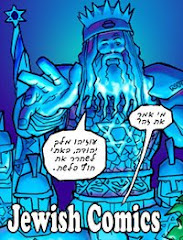2 days before that, though, certain Jews (and interested non-Jews) will be gathering at The Graduate Center to listen to a panel of (mostly) Jewish people discuss Yiddish history and culture. Specifically, they will be discussing a new graphic anthology recently published by Abrams titled Yiddishkeit : Jewish Vernacular and the New Land. Yiddishkeit, edited by Paul Buhle and the late Harvey Pekar z"l is descibed as :
the last fully realized work by the late Pekar [which] unveils the lasting influence of Yiddish on American culture.
On the panel will be :
playwright and author Allen Lewis Rickman, National Yiddish Book Center founder Aaron Lansky (whose quest to save Yiddish is featured in one of the anthology's stories), cartoonist Ben Katchor, anthology contributor Danny Fingeroth (who authored the book Disguised as Clark Kent : Jews, Comics, and the Creation of the Superhero), Sabrina Jones, Jewish Currents editor Larry Bush, and anthology co-editor Paul Buhle.
Date : Wed., Oct. 5, 2011
Venue : The Graduate Center
365 Fifth Avenue (at 34th Street)
New York, NY 10016
Cost : $10.00
Tickets may be purchased online at http://www.smarttix.com/show.aspx?showcode=GOT7
Yiddishkeit made Quimby's Top 10 Weekly list (at #6) for the week of Aug. 31st and its cover was chosen as the Book Cover of the Week by Jewish Book World's Naomi Firestone-Teeter on August 10th.
An excerpt by Neal Gabler may be found at http://www.tabletmag.com/arts-and-culture/books/76190/yiddishkeit/.
Original artwork (which is for sale) by Dan Archer may be viewed a http://www.archcomix.com/buy-artwork/.
What have people been saying about Yiddishkeit thus far?
Choice review excerpts below (with links to the full commentary).
Gilles d'Aymery, Swans Commentary
"Neither pedagogic nor didactic, the scripts are superb, the drawings splendid, and as Paul Buhle wrote in his Editor's Note, 'the culture of Yiddish is so inherently vernacular that comics art provides a perfect venue for an exploration of issues and personalities.' A significant historical and cultural book not to be missed."
David from New York, Amazon.com
"a scholarly book, this isn't; a thorough and enjoyable book this is. Don't think Talmud; think The Wise Men of Chelm as if Chelm were the USA. I can't think of a better introduction to Yiddishkeit."
Sephora Markson Hartz, Secular culture and ideas, rethinking Jewish
"In the end, Yiddishkeit is worth reading not because Pekar is a dazzling storyteller, but because he is,as Buhle notes, an 'idiosyncratic' one. The force of Harvey Pekar’s personality has always been his greatest asset, as is his life-long interest in giving new life—and pressing new relevance—to seemingly marginal subjects. True, you may dispute some of Pekar’s assessments of Yiddish culture, but nevermind. You’ll find yourself blissfully enchanted by his eccentricities."
Steven Heller, Imprint
"Rich in lore and folkways, the book trace the influence of Yiddish from medieval Europe to New York's Lower East Side. Yiddishkeit means 'Jewishness,' as in a 'Jewish way of life.' "
Rick Klaw, Nexus Graphica
"Perhaps the most unusual and unexpected graphic work of the year, the impressive Yiddishkeit successfully peels back centuries of scholarship and dogma while revealing the nuances of the colorful language and its impact on contemporary society."
Paul Kupperberg, Comicmix.com
"Yiddishkeit is an introduction to dozens of lost or forgotten Yiddish authors, and a compelling overview of just how influential the Jews and their particular way of seeing life were in shaping American pop culture (from MAD Magazine to Woody Allen)."
Josh Lambert, Forward
"Like the collection of kitschy coffee mugs and refrigerator magnets that Shandler analyzes as epitomizing that phenomenon, 'Yiddishkeit' aims to interact with and influence the relationship between Yiddish culture and people who don’t read or speak the language. Specifically, the book promulgates a familiar set of ideas about Yiddish: that it was 'focused on the here and now rather than on airy philosophical discourse,' as pop historian Neal Gabler says in his introduction; that it was an incubator for communists, socialists, anarchists and other leftists, which is what Buhle tends to emphasize, and that it was the medium for a rich and neglected modern literary and performance tradition and has indelibly marked American popular culture forever after."
David Luhrssen, Express Milwaukee
"Yiddishkeit is by no means a comprehensive study of Yiddish film, Jews in Hollywood or the leavening effect of the Jewish sensibility on the dour culture of WASP America. But it's a fun and informed read—one that will make many of us search for more material on the various subjects it touches."
Mae "mes2000", Amazon.com
"The visual treatment of literary and biographical topics in 'Yiddishkeit' is fun, but very truncated: for example, it offers a 3-page summary of Aaron Lansky's memoir 'Outwitting History,' (which I think is actually a better treatment of Yiddish in America) and a 12-page 'retelling' in graphic form of the 1937 Yiddish movie 'Greenfields.' "
Laura Miller Salon.com
"this fabulous rich volume has much to tell everyone about the roots of our national humor, drama and vernacular language."
Noel Murray, The A.V. Club
"There’s a lot of quality material here, though, including a series of concise, anecdotal one-pagers written by Joel Schechter and drawn by Spain Rodriguez. And Pekar fans will appreciate getting one more chance to read his impassioned, sometimes cranky opinions about the artists America embraces and the ones they unjustly ignore."
Allan Nadler, Jewish Ideas Daily
" The result is a stunningly colorful but dizzyingly messy comic bouquet to secular Yiddish culture."
Publishers Weekly
"The art is provided by a number of notables, including Spain Rodriguez, Peter Kuper, and Sharon Rudahl, every bit of it brimming with the charm and flavor of its subject and seamlessly meshing with the text to create a genuinely compelling, scholarly comics experience."
Tom Spurgeon, the Comics Reporter
"Its existence in comic shops is as wonderfully odd and potentially jarring in its own way as some of the weirder and more depressing stuff that shops offer up."







No comments:
Post a Comment